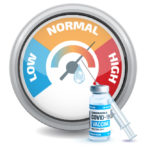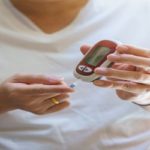Diabetes
Higher Dose Of Semaglutide Found Safe For Additional Glycemic Control
A 2.0 mg dose Semaglutide, an incretin mimetic, was found to be safe and more effective in glycemic control and body weight loss, than 1.0 mg of semaglutide, according to a study published in ‘The Lancet Diabetes & Endocrinology’. This study was conducted among 961 participants, to test the safety, efficacy, and potential benefits of a higher dose of semaglutide in glycemic control, compared to the conventionally used dose.
The key results were as follows:
- Lower glycated hemoglobin or hemoglobin A1C (HbA1c) in the group taking 2.0mg of semaglutide than the group taking 1.0 mg semaglutide.
- Higher rate of weight loss in the group taking 2.0 mg of semaglutide than the group taking 1.0 mg dose of semaglutide.
- Serious adverse events were similar between both 1.0 mg and 2.0mg semalglutide treatment groups, indicating similar safety profile.
In conclusion, the authors of this study found that semaglutide 2.0 mg was superior to 1.0 mg in treatment outcomes and had similar safety profile. This provides : good option for intensification of treatment for patients on semaglutide, who may need additional glycaemic control.
1. Frías JP, Auerbach P, Bajaj HS, Fukushima Y, Lingvay I, Macura S, Sondergaard AL Tankova TI, Tentolouris N, Buse JB. Efficacy and safety of once-weekly semaglutide 2.0 mg versus 1.0 mg in patients with type 2 diabetes (SUSTAIN FORTE): a double-blind, randomised, phase 3B trial. Lancet Diabetes Endocrinol. 2021 Sep;9(9):563-574. https://pubmed.ncbi.nlm.nih.gov/34293304/. Accessed on 30-10-2021.

Urban India Sicker than Rural India, says NHFS-5 (2019-21)
Read More

NFHS-5 (2019-21) Finds Indians Have More Health Risk Than Previously Recorded In NFHS-4 (2015-16)
Read More

Structured Blood Glucose Monitoring (BGM) vs. Continuous Glucose Monitoring (CGM) – What Leads to Improved Glucose Control?
Read More

Can a Telemedicine Management System Improve Self-Management and Treatment of Overweight/ Obese T2DM Patients?
Read More

Associations Between Poor Glycemic Control and Breakthrough SARS-CoV-2 Infection
Read More

Are Digital Diabetes Prevention Programs (d-DPPs) Effective in Improving Outcomes in Prediabetics?
Read More

Why Dietary Carbohydrate Restriction is Beneficial for T2DM Patients?
Read More

Is the ‘Plate Model’ an Effective Strategy for Improving Glycemic Control in T2DM Patients?
Read More

What is the Significance of Glycemic Variability in Diabetes Mellitus?
Read More

Can Foot-Ankle Exercise Intervention Programs Improve Gait Speed in People with Diabetic Neuropathy?
Read More

Is There An Association Between Antidepressant Use and Advanced Diabetes Complications?
Read More

Are Patients with T2DM at a Higher Risk of Experiencing Antibiotic-Resistant Bacterial Infections?
Read More

Can Textured Soybean Protein Consumption Improve Blood Biochemistry in Patients with T2DM?
Read More

Adding Liraglutide To SGLT2i And Metformin Regimen Improves Glycemic Control
Read More

Dapagliflozin improves albuminuria in patients with high cardiorenal risk
Read More
